新牛津英语第四单元
牛津英语七年级上册第四单元全部精品课件
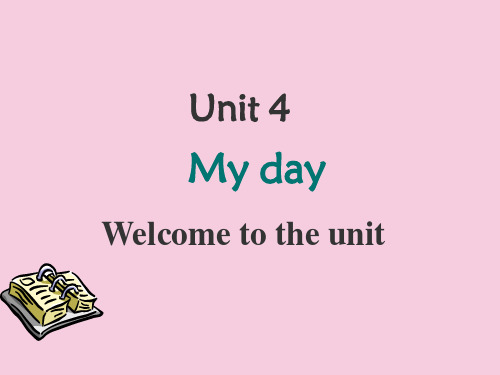
at 7:30 p.m At 9:30 p.m. she ______ to bedg. oes
Task:To complete your day
Time 6:30 7:00 7:30 11:45 11:50 12:30 2:00 p.m. 5:15 p.m. …
27.通常去上学___u_s_u_a_l_ly___g_o_t_o__s_chool 28.起床_g_e_t__u_p________
1.是吃早饭的时候了嘛? Is it time for breakfast?
2.我们去山上散步好吗?
Shall we go walking in the hills?
Shall we go walking in the hills?
No. I seldom go out . After breakfast, I sleep, and then I have lunch . After lunch, I always need a good rest.
Answer the questions:
表示提出或征求意见:
Shall I / we…? = What about doing / how about doing …? =Why not do sth?=Let’s do dth.
3.I seldom go out.我很少出去
seldom(很少),never(从不),频度副词, 表示否定的意思。划线提问用 ____h_o_w_o_f_te_n__同类的表示否定的词还 有few, little 她很少吃蛋糕。
Millie’s day
新牛津译林版英语九年级上册第四单元ReadingI

Task 5 Retell Spud’s life
Year & place of birth Height Dream Junior High
Task 1 Pre-reading: Listening
1. Why was Spud Webb often refused during his basketball career?
Because he was too small.
2. Basketball players are usually very tall, aren’t they?
Height: 198cm
Height: 226cm
Height: 198cm
Spud Webb
Height: 170cm
Spud Webb
斯伯特·韦伯于1963年 出生,因为身高只有1米 70、被昵称为“土豆” 的他,竟在1986年“扣 篮大赛”中从“人类电 影精华”威尔金斯手中 不可思议地夺得“扣篮 王”称号,成为NBA的 传奇。
Paragraph 4
Spud Webb’s basketball career
At first Then
Achievements
College/ __N__o__
University university invited him.
He decided He led his team to
to plaቤተ መጻሕፍቲ ባይዱ at __t_h_e__n_a_t_i_o_n_a__l ___
六年级下册牛津版第四单元作文范文英语
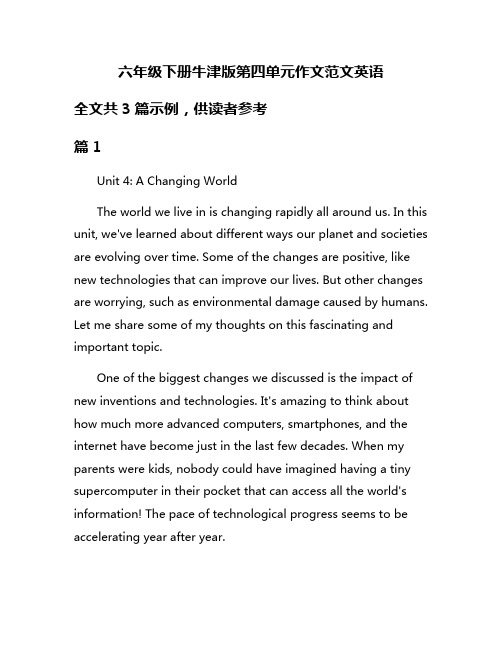
六年级下册牛津版第四单元作文范文英语全文共3篇示例,供读者参考篇1Unit 4: A Changing WorldThe world we live in is changing rapidly all around us. In this unit, we've learned about different ways our planet and societies are evolving over time. Some of the changes are positive, like new technologies that can improve our lives. But other changes are worrying, such as environmental damage caused by humans. Let me share some of my thoughts on this fascinating and important topic.One of the biggest changes we discussed is the impact of new inventions and technologies. It's amazing to think about how much more advanced computers, smartphones, and the internet have become just in the last few decades. When my parents were kids, nobody could have imagined having a tiny supercomputer in their pocket that can access all the world's information! The pace of technological progress seems to be accelerating year after year.On one hand, I'm really excited about all the amazing new gadgets, apps, and capabilities headed our way. Virtual reality could revolutionize video games and entertainment. Artificial intelligence may be able to solve problems that stump even the brightest human minds. Advancements in medicine could lead to cures for diseases that have plagued humanity for centuries. The future looks incredible from a technology standpoint.However, I do have some concerns about our increasing reliance on technology as well. What if we become overly dependent on computers and smartphones to the point where we lose basic skills? Watching friends who can't even do simple math without a calculator makes me worried. And while the internet gives us access to more information than ever before, it's also much easier to get distracted or misled by unreliable sources online.Another huge change impacting our world is climate change and environmental damage caused by human activity. It's quite alarming to learn about rising temperatures, melting ice caps, ocean acidification, deforestation, and extinctions happening at a rapid rate. My generation will face serious challenges from climate change that previous generations didn't have to confront.Of course, many people still debate the extent of the problem and how best to address it. But from what we've studied, it seems overwhelmingly clear that human actions like burning fossil fuels, polluting, and unsustainable practices are altering the planet's climate in risky ways. Extreme weather events like droughts, wildfires, and powerful storms seem to be increasing in frequency and intensity.I believe we all have a moral obligation to change our wasteful and harmful habits as soon as possible. From using less plastic, to conserving energy, to reducing meat consumption, there are many adjustments we can make to our lifestyles. Developing renewable energy sources like solar and wind is crucial too. It will be difficult and require sacrifice, but we simply must take drastic action to protect the environment for future generations.Another major way the world is transforming revolves around globalization and the increased connections between countries. With air travel, the internet, international trade, and immigration, our world is rapidly becoming more interconnected culturally and economically. This brings many benefits in terms of sharing ideas, products, and diverse perspectives across the globe.However, it also creates new challenges. Some people fear losing their cultural identity and traditions as other influences spread. Economic inequality between nations can breed resentment. Having so many different worldviews interacting increases the potential for conflicts and misunderstandings as well.Ultimately though, I tend to view globalization as a positive direction overall for the world. By learning about other cultures, we can gain fresh perspectives and appreciate the diversity that makes humanity so fascinating. And as we become more accustomed to collaborating across borders, it could diminish conflicts and bigotry over time.The changes occurring in demographics and how we understand gender and identity are also very interesting to consider. Society's attitudes toward gender have evolved significantly in recent decades. There is much more acceptance and awareness of people who identify outside of traditional male/female categories or conventional gender roles today.From a personal standpoint, I don't fully understand all the nuances and sensitivities around these issues yet. But I do try my best to be respectful, keep an open mind, avoid offensive language, and accept that gender can be more complex and fluidthan the simplistic binary views of the past. As long as we're not hurting anyone, I believe people should have the freedom to express themselves however they wish in terms of identity and gender.Another area where change is afoot is around the future of work and job markets. Recent decades have seen manufacturing jobs in fields like autos and steel disappear. Now even professional positions in areas like accounting, finance, and law are being impacted by automation and artificial intelligence. Who knows how many types of jobs will be made obsolete or radically transformed by technology breakthroughs in the years ahead?Though it creates economic anxiety and hardship for many in the short-term, I actually see this as a potential positive in the long run. Rather than being confined to repetitive, tedious tasks that machines can do more efficiently, hopefully we can shift into more fulfilling roles that allow human creativity and skills like emotional intelligence to shine. Of course, we will need to adapt our education and workforce training to help people acquire the right knowledge for the jobs of the future.In addition to the workforce shifting, our cities and how we live could transform considerably too. Perhaps more people willbe able to work remotely and live in smaller towns rather than crowded urban centers. Reducing lengthy commutes would be better for the environment and our mental health. However, thriving cities with walkable amenities, public transit, and density are more eco-friendly living models compared to suburban sprawl.There are pros and cons to weigh when envisioning how we'll live and get around in the future. On one hand, autonomous self-driving cars and ridesharing services could reduce traffic and emissions. But trying to sustain inefficient, car-dependent infrastructure and urban design is unsustainable. It may require major investments and sacrifices, but designing more livable, sustainable communities seems like the smartest long-term path.Of course, changes like these wouldn't come easily or without challenges. Any major societal shifts are bound to meet resistance from people worried about threats to their traditions, belief systems, or way of life. Dealing with those tensions between preserving core values and adapting to new paradigms won't be simple.But looking back through history, cultures and civilizations have always evolved over time while still maintaining theiressential identities. My hope is that by being open to positive changes that improve our lives while holding onto our most cherished principles and wisdom, humanity can navigate this era of rapid transformation successfully.At the end of the day, changes–whether technological, environmental, social, or economic–are simply inevitable facts of life in our dynamic world. Though there are certainly risks and tradeoffs to weigh, I'm optimistic that we have the ingenuity and compassion to harness these transformations in positive ways. By staying educated, maintaining keen judgement, and upholding ethical principles, we can steer these changes toward building a better, more just, and sustainable future for all.篇2My Inspiring Role ModelEveryone needs a role model in life - someone to look up to and admire, who can motivate and guide us to become better people. For me, that person is my uncle, David Thompson. He has had a profound impact on my life and continues to inspire me every day.Uncle David is someone who has overcome many challenges and adversities through sheer determination and resilience. Hegrew up in a small town, raised by a single mother after his father passed away when he was very young. Despite their financial struggles, he was an excellent student and received a scholarship to attend university. However, during his first year, he was involved in a terrible accident that left him paralyzed from the waist down and confined to a wheelchair.Many people in his situation might have given up hope and resigned themselves to a life of limitations. Not my uncle David. With an incredible fighting spirit, he resumed his studies while adapting to his new circumstances. He learned to navigate the world from his wheelchair, becoming fiercely independent. After graduating, he started his own technology company from his home. Through his brilliance and tireless work ethic, that small startup grew into a multi-million dollar business over the next decade.Uncle David's professional success alone would be enough to inspire admiration. But what makes him an even more remarkable role model is his commitment to helping others. He generously donates a large portion of his income to charities that support people with disabilities, scholarships for underprivileged students, and medical research. He also frequently gives motivational speeches at schools andcommunity events, encouraging people to pursue their dreams no matter what obstacles they face.On a personal level, Uncle David has been a constant source of guidance and wisdom for me. Whenever I feel overwhelmed by a challenge or start doubting myself, he reminds me that life's greatest obstacles are opportunities to grow stronger. He counsels me to maintain a positive mindset, work hard, and never give up on my goals. His perseverance and accomplishments, despite his disability, demonstrate that you can achieve anything you set your mind to with enough passion and dedication.I'll never forget when I was 10 years old, and my parents were going through a difficult divorce. I was angry, sad and struggling in school. Uncle David took me aside one day and said, "The hardships we face in life should motivate us, not discourage us. Don't let this situation define you or determine your future success. Use it as fuel to become an even better person." Those words had a profound impact on me and gave me the strength to overcome that turbulent period in a positive way.Today, as a teenager preparing for the transition to adulthood, I continue to be inspired by Uncle David's example. He motivates me to dream big, but also to give back to mycommunity. Despite his wealth and acclaim, he remains humble, grounded and genuinely caring towards others. He lives his life according to strong ethical principles and does what he believes is right, rather than simply what is easy or popular.Uncle David has demonstrated that you don't have to be a famous celebrity or historical figure to be a great role model. An ordinary person who overcomes extraordinary circumstances through courage, compassion and integrity can be just as inspirational. He will always represent the ideals that I strive towards - resilience, generosity, ethical strength, and the unwavering pursuit of one's calling in life despite any obstacles.When I need motivation to work hard in school, remember the value of helping others, or simply do the right thing even when it's difficult, I need only think of my incredible uncle. His empowering life story fills me with hope, drive and determination. I'm so grateful to have such a positive guiding light in my life. Uncle David has shown me that anything is possible if you refuse to let adversity define you. One day, I hope to use the lessons he taught me to become a role model myself and positively impact the lives of others, just as he has done for me.篇3My Unforgettable Summer VacationThis past summer, I had the most amazing and unforgettable experience of my life so far. My family and I went on an incredible adventure to South Africa! We spent three weeks exploring the breathtaking natural scenery, learning about the rich cultures and history, and seeing some truly incredible wildlife.Our trip started in the vibrant city of Cape Town. I was in awe of the stunning Table Mountain that overlooks the city. We took a cable car up to the top and the views were just spectacular - you could see the whole city, the harbour, the beaches, and the vast ocean stretching out to the horizon. The next day, we visited Robben Island, where Nelson Mandela was imprisoned for 18 years. Walking through the tiny cell where he lived was a very somber experience that made me appreciate how fortunate I am.After a few days in Cape Town, we rented a car and started our road trip along the famous Garden Route. Our first stop was Hermanus, which is known as the best place for whale watching in South Africa. We took a boat tour and saw several massive southern right whales breaching and playing right next to our boat! It was incredible to be so close to such enormous yet gentle creatures.Next, we drove through the Tsitsikamma National Park, stopping to do some easy hiking through the coastal forests. The scenery was like something out of a fairytale - towering trees draped with moss, winding paths, waterfalls, and streams. We also did the famous suspension bridge hike across a dramatic gorge. Even though the bridge was bouncing a lot, the views down into the gorge were worth conquering my fear of heights!One of the highlights was our visit to an elephant sanctuary near Plettenberg Bay. We were able to get upclose and interact with the elephants, feeding them buckets of fruit and veggies. They use their trunks so dexterously to grab the food - it was amazing to watch. We also learned all about their behavior and tragic history of being hunted for their ivory tusks.The safari portion of our trip was definitely the most exciting and memorable part. We spent four nights at a private game reserve in the world-famous Kruger National Park area. Every morning, we went on game drives in an open-top Land Rover to look for the "Big Five" - lions, leopards, buffalo, elephants, and rhinos. Our expert guide could spot animals from incredibly far away and knew so much about their behaviors and habitats.On our very first drive, we were lucky enough to see a huge male lion resting under a tree. It was unbelievable to be so closeto this powerful predator in its natural environment. The next day, we tracked a pride of lions feasting on a zebra they had killed. While a bit gruesome, it was a spectacular sight to see such raw nature in action. We also saw tons of other animals like giraffes, zebras, antelope, wildebeest, warthogs, hippos, crocodiles, and countless exotic birds.One of my favorite moments was watching a big male leopard climb down from a tree right in front of our vehicle. Our guide said we were incredibly lucky, as leopards are very elusive and rarely seen in the daytime. The leopard walked mere feet past our truck before disappearing into the bushes. Seeing this beautiful and stealthy predator up so close was simply breathtaking.In the evenings after our game drives, we would relax around the fire pit at our luxurious lodge, sipping hot chocolate and listening to the sounds of the wild nightlife awakening. A friendly outdoor instructor taught us about stargazing and pointing out amazing constellations in the clear night sky - something you can't see from the light-polluted cities. Sleeping in our thatched bungalows with just the sounds of crickets and the occasional lion's roar in the distance made it feel like we were truly immersed in nature.Our final stop was at the famous Victoria Falls on the border of Zimbabwe and Zambia. Words can't describe the massive, thundering power and natural beauty of these 355 foot tall waterfalls. The mist from the falls was like a constant rain, creating gorgeous rainbows in the sunlight. We took a thrilling helicopter ride over the falls which was one of the highlights of the whole trip.This trip to South Africa was honestly the best experience of my entire life so far. In just three weeks, I feel like I learned so much about the world, different cultures, nature and conservation. I'll never forget the thrill of seeing wild animals up close, or the beauty of the diverse landscapes. From the bustling cities to the untamed bush, South Africa has an endless amount to offer visitors. I feel so lucky and grateful to my parents for allowing me to have this incredible adventure. It's an experience I'll cherish forever as I look forward to many more amazing travels in the future.。
【新牛津译林版】七年级英语第一学期第四单元Reading
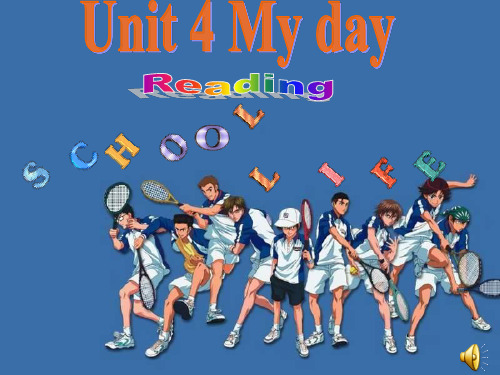
my classroom is on the (5)_g_ro__u_n_d_ floor. We also have an (6)__a_rt_ room, a music room and two (7)_c_o_m__p_u_te_r_ rooms. Our library is new and (8)_m_o__d_e_rn_. There are lots of books. We often go there in the afternoon. We also have a school (9)_h_a_ll__. We have meetings there. Our school is really nice. We all love it.
Now I am a student at Sunshine Middle School.
…… Main body正文
Best wishes,
Millie From……
Skill 1:Skimming(略读)
What is main idea of the email? It’s about Millie’s school day.
She goes to the schooll_ib_r_a_r_y___ . Sometimes she practise playing _v_o_ll_e_y_b_a_ll with her friends after school. She is a member of the _v_o_l_le_y_b_a_ll_t_e_a_m__ . They always ___h_a_v_e_ ___a____ _g_o_o_d____t_im__e___.
Unit 4 重要词汇详细讲解 2020-2021学年牛津高中英语选择性必修第一册

2020新版牛津英语选择性必修第四单元重要词汇详细讲解1.barren 贫瘠的不毛的不结果的fertile 肥沃的富饶的能生育的2.freeze—froze—frozen a 结冰的冰冻的冻僵的3.imply vt 暗含暗示暗指 +n/句子4.dimension 方面侧面 a new dimension规模程度 education’s ···维度尺寸 three dimensions5.grasp vt 抓住抓紧 grasp ···理解掌握明白 +句子n 紧抓控制别让局面失去控制理解力领悟6.detect vt 发现查明侦查出—detective—detection7.rhyme vt 使押韵 thyme A with Bvi 和···押韵 A rhyme with Bn 押韵押韵词rhythm n 节奏韵律律动规律plex complicated confused9.contradictory a 相互矛盾的对立的contradict A contradict B A与B相矛盾10.dig up 挖出 dig sth up发现搜集查明 =find out11.thrill vt 使···兴奋激动—thrilled—thrillingn 兴奋激动 the thrill to do sththe thrill of doing sth12.interpret vt 解释阐释 =explain把···理解掌握领会=understand/grasp演绎 interpret the rolevi 口译 + for···13.s et···aside 把···放到一边留出 set aside one hour14.remote 遥远的偏远的 remote control15.reward vt 奖励奖赏 reward sb with···n 奖励回报悬赏金额 a reward of16.constant 持续不断的重复的···interruptions不变的固定的恒定的 a ···speed17.logical 符合逻辑的必然的合乎情理的logic 逻辑思维逻辑逻辑学18.inner 内部的里面的内心的—outer19.perceive 注意到意识到觉察到=notice将···理解为···将···视为She didn’t perceive him as disabled. 20.reality 现实实际事实realistic 实际的现实的逼真的栩栩如生的21.mist n 薄雾水汽–misty a 多雾的模糊的22.rigid a 僵硬的死板的(规则方法等)固执的一成不变的(人)坚硬的不弯曲的(物质物体)23.undergo—underwent—undergone 经历遭受=go through24.industrialization n 工业化25.advocate vt 支持拥护提倡 + n/doingn 支持者拥护者26.diverge vi 分叉岔开 diverge from···偏离分歧 diverge from···27.bend vt 使拐弯使弯曲 He bent his head and kissed her. vi 倾斜偏向 He bent and kissed her.n 拐弯弯道28.claim vt 宣称 +n/句子/ to be···要求索要 + n夺走夺去 claim one’s lifen 宣称断言所有权索取索赔29.thread n 线线索思路思绪脉络v 穿针引线穿过30.sigh vi sigh (with)n give out a deep sigh31.hence adv 因此比较正式Hence(,)+句子32.dare 敢情态(否疑条) + doIf you dare say that to···She daren’t express herself.实意(肯否疑) + to do(否定句可以省略 to) She doesn’t dare (to)express herself.激某人做某事:dare sb to do sthSomeone dared him to do it.33.striking adj 引人注目的印象深刻的显著的34.characterize vt 以···为特征以···为典型Obesity is characterized by···使···具有特点The city is characterized by···描述刻画35.encounter vt 偶遇偶然碰到= come acrossn 偶遇相遇冲突36.nourish vt 培养助长滋养抚养Children are nourished well in good physical condition.37.glorious 光荣的荣耀的壮丽的辉煌的glory n 光荣荣耀赞颂38.boom vi 繁荣昌盛迅速发展 Business is booming.n 繁荣激增 a boom in ···39.stability n 稳定性稳固性stable a 稳定的稳固的牢固的沉稳的稳重的40.tolerant a 容忍的宽容的能忍耐的tolerate vt 容忍忍受···tolerance n 忍耐性41.liberty n 自由liberate v 释放 liberate···from···42.unconstrained a 自由的不受约束的constrain v 强迫强制 constrain sb to do限制限定 be constrained from doing 43.vitality 生命力活力热情vital 极重要的必不可少的必须的44.distinguish v distinguish A from B 把两者分开distinguish (between) A and Bdistinguished adj 杰出的卓越的著名的高贵的45.exaggeration n 夸大夸张exaggerate v 夸大夸张言过其实+ difficulty 46.metaphor n 暗语隐喻analogy n 比喻类比47.representative a 典型的有代表性的n 代表代理人代表性人物represent v 代表作为···的代言人维护···的利益相当于48.frost n 霜霜冻寒冷天气vi 结霜 frost (sth)over/up.49.cast vt 向···投以(视线笑容等)投射影子cast a smile cast its shadow over the river 仍投掷 cast sth分配角色选派角色 cast sb as the lead role.n 全体演员投抛50.owe vt 欠··· owe sb sth = owe sth to sb把···归功于归因于···owe sb sth = owe sth to sb51.fascinate vi 深深吸引使着迷 A fascinate B52.entitle vt 给···命名 a book entitled “S pring”使享有权利 be entitled to (do)sth53.blame v责备blame sb for sth 因为···责备某人blame sth on sb 责备···关于某事n 责备 sb be to blame 某人应该受到责备54.allowance n 津贴补助限额定量living/travel allowance 住房交通补贴make allowance for sth 考虑到···=allow for55.triumph v 战胜打败成功 triumph over ···n 巨大的成功重大成就伟大胜利56.impostor n 冒名顶替者 =imposter57.unforgiving 棘手的不宽容的不饶人的forgive 原谅宽恕。
新牛津译林版英语九年级上册四五单元重点词组和句型归纳
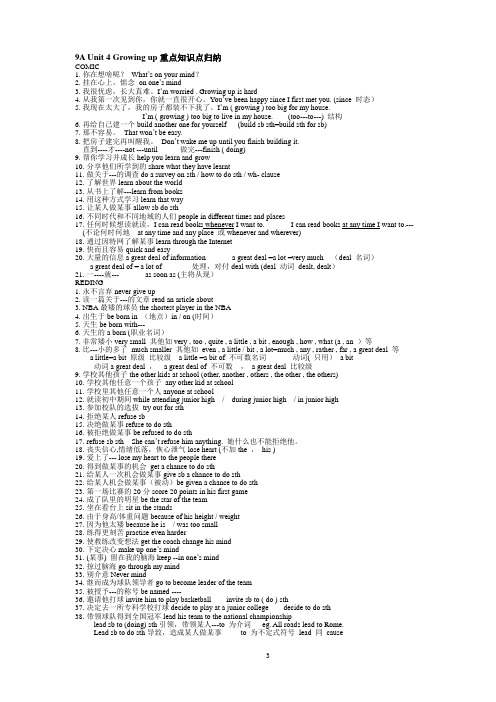
9A Unit 4 Growing up重点知识点归纳COMIC1.你在想啥呢?What’s on your mind?2.挂在心上,惦念on one’s mind3.我很忧虑,长大真难。
I’m worried . Growing up is hard4.从我第一次见到你,你就一直很开心。
You’ve been happy since I first met you. (since 时态)5.我现在太大了,我的房子都装不下我了。
I’m ( growing ) too big for my house.I’m ( growing ) too big to live in my house. (too---to---) 结构6.再给自己建一个build another one for yourself (build sb sth=build sth for sb)7.那不容易。
That won’t be easy.8.把房子建完再叫醒我。
Don’t wake me up until you finish building it.直到----才----not ---until 做完---finish ( doing)9.帮你学习并成长help you learn and grow10.分享他们所学到的share what they have learnt11.做关于---的调查do a survey on sth / how to do sth / wh- clause12.了解世界learn about the world13.从书上了解---learn from books14.用这种方式学习learn that way15.让某人做某事allow sb do sth16.不同时代和不同地域的人们people in different times and places17.任何时候想读就读。
I can read books whenever I want to. I can read books at any time I want to.--- (不论何时何地at any time and any place 或whenever and wherever)18.通过因特网了解某事learn through the Internet19.快而且容易quick and easy20.大量的信息a great deal of information a great deal =a lot =very much (deal 名词)a great deal of = a lot of 处理,对付deal with (deal 动词dealt, dealt)21.一----就--- as soon as (主将从现)REDING1.永不言弃never give up2.读一篇关于---的文章read an article about3.NBA最矮的球员the shortest player in the NBA4.出生于be born in (地点)in / on (时间)5.天生be born with---6.天生的a born (职业名词)7.非常矮小very small 其他如very , too , quite , a little , a bit , enough , how , what (a , an )等8.比---小的多了much smaller 其他如even , a little / bit , a lot=much , any , rather , far , a great deal 等a little=a bit 原级比较级 a little =a bit of 不可数名词动词( 只用)a bit动词a great deal , a great deal of 不可数,a great deal 比较级9.学校其他孩子the other kids at school (other, another , others , the other , the others)10.学校其他任意一个孩子any other kid at school11.学校里其他任意一个人anyone at school12.就读初中期间while attending junior high / during junior high / in junior high13.参加校队的选拔try out for sth14.拒绝某人refuse sb15.决绝做某事refuse to do sth16.被拒绝做某事be refused to do sth17.refuse sb sth She can’t refuse him anything. 她什么也不能拒绝他。
【个人手工制作】新牛津英语模块十一第四单元课外趣味阅读及练习题
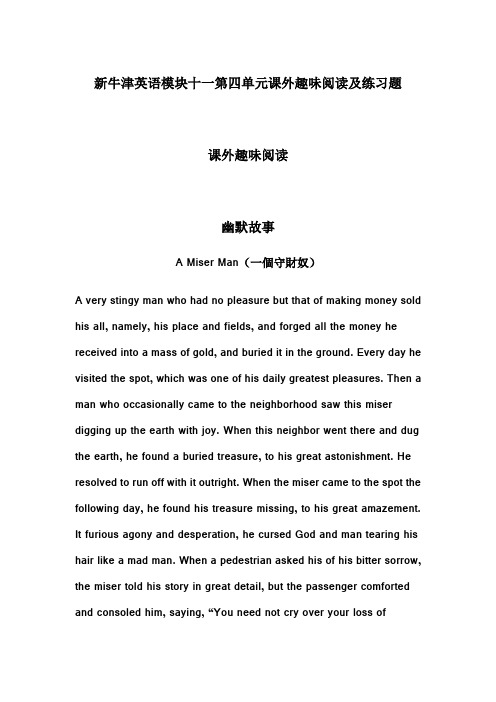
新牛津英语模块十一第四单元课外趣味阅读及练习题课外趣味阅读幽默故事A Miser Man(一個守財奴)A very stingy man who had no pleasure but that of making money sold his all, namely, his place and fields, and forged all the money he received into a mass of gold, and buried it in the ground. Every day he visited the spot, which was one of his daily greatest pleasures. Then a man who occasionally came to the neighborhood saw this miser digging up the earth with joy. When this neighbor went there and dug the earth, he found a buried treasure, to his great astonishment. He resolved to run off with it outright. When the miser came to the spot the following day, he found his treasure missing, to his great amazement. It furious agony and desperation, he cursed God and man tearing his hair like a mad man. When a pedestrian asked his of his bitter sorrow, the miser told his story in great detail, but the passenger comforted and consoled him, saying, “You need not cry over your loss oftreasure. I think your loss is not so great as you think. Bury in that place a stone of the same size in place of your mass of gold, and regard it as your lost one. You will hardly tell the difference the two, because, as far as you are concerned, gold is all one with a stone in point of utility.” Happiness does not consist in owning money, but in reasonable using of it.一个非常吝啬的人谁不喜欢的,但卖掉了他的所有赚钱的,也就是说,他的位置和田地,和伪造的所有的钱他收到成一团的金子,葬在地下。
新牛津译林版英语九年级上册第四单元reading部分单词教学课件
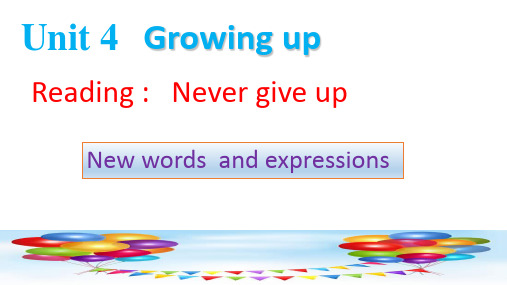
20. prove
vt. 证明
Who can prove it? 谁能证明这一点?
Through hard work, he proved that size and body type does not matter.
通过努力,他证明了高矮胖瘦并不重要。
21. matter
He remains poor.
他仍然很穷。
18. take notice of 注意,察觉
He didn’t take notice of me.
注意: notice 注意,(名词)
19. achievement
①成就,业绩(可数);②实现,达到(不可数)
He had many great achievements.
注意: graduation是名词
15. force
vt. 强迫,迫使
After he graduated, he was forced to play in another basketball league.
注意: force sb to do sth force还可以是名词,力量,暴力
16. league
Unit 4 Growing up
Reading : Never give up
New words and expressions
1.junior high (美) 高级中学
attend junior high 上初中
in senior high
在高中
junior:①adj.较年幼的,级别较低的 ②n. 年少者
5. leader n. 领导者
a person who leads a group of people
新牛津译林版英语九年级上册第四单元 Welcome to the unit

Make up a dialogue:
A: How do you learn about the world? B: .... A: Why do you like to learn that way? B: ....
What about you? A: .... B: Is that so? A: ...
3.The loss of the money has been a weight on my m_in_d_______.
II:根据汉语意思完成句子 1.不论发生什么事,我都不会改革心意。
_W__h_a_t_e_v_er__ happens, I won’t change my mind. 2.每个人登机前都要通过安检。
2. Why does she like to learn that way? Because books allow her to learn about people in different times and places.
3.What does Simon learn about the world? Through the Internet.
请点击
I. 用方框中词的适当形式填空。
whenever through time
1. The film takes us back to the __ti_m_e___ of the American War of Independence.
2. I’ll discuss it with you _w_h_e_n_e_v_e_r you like.
3. I heard of the job _th_r_o_u_g_h_ a newspaper advertisement.
2024新版牛津英语 三年级上册 Unit4 第四单元单元测试卷练习题
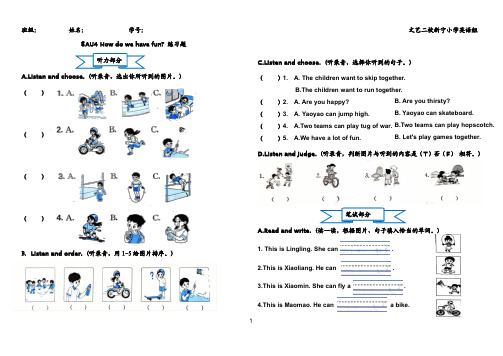
13AU4How do we have fun?练习题听力部分A.Listen andchoose.(听录音,选出你所听到的图片。
)()()()()B.Listen and order.(听录音,用1-5给图片排序。
)C.Listen and choose.(听录音,选择你听到的句子。
)()1. A.The children want to skip together.B.The children want to run together.()2. A.Are you happy?()3. A.Yaoyao can jump high.()4. A.Two teams can play tug of war.()5. A.We have a lot of fun.D.Listen and judge.(听录音,判断图片与听到的内容是(T)否(F)相符。
)笔试部分A.Read and write.(读一读,根据图片、句子填入恰当的单词。
)1.This is Lingling.She can.2.This is Xiaoliang.He can.3.This is Xiaomin.She can fly a.4.This is Maomao.He can a bike.B.Are you thirsty?B.Yaoyao can skateboard.B.Two teams can play hopscotch.B.Let's play games together.25.This is me.I’m Xiaoyang.I can fast.B.Read and choose.(读一读,根据情境选择正确的选项。
)()1.The________are at their grandparents'house.A.childB.childsC.children()2.I_______fly a kite,but he_________.A.can;canB.can't;can'tC.can;can't()3.Our mother can_________fast.A.jumpsB.skipC.running()4.Yaoyao wants________you.A.to helpB.helpsC.help()5.—What can Xiaoxiao do in the park?A.She can skateboard with her mum.B.I can't skip.C.She is too fast.()6.—I want to________some juice.—I can_____you.A.bring;findB.bring;helpC.get;seeC.Look and choose.(看一看,根据图片选择相应的句子。
新牛津译林版英语九年级上册第四单元 grammar
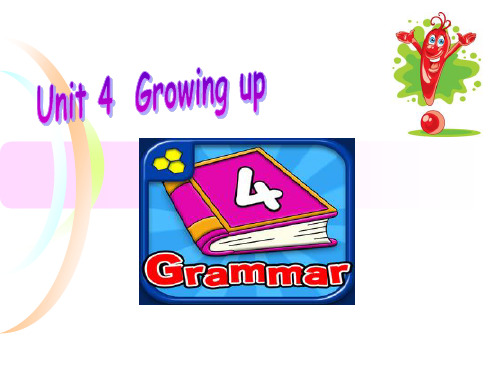
I went to school after I finished my breakfast. 我吃完早饭去上学。
How to use “when” & “while”?
• When he was 9, he took some basketball training.
Words review
career n. 生涯,职业 against prep. 对抗;与……
相反;违反
Do you know him?
How much do you know about him?
2.08m & 1.88m
_B__e_f_o_r_e_ he was born,
he was believed to become a future basketball star.
2. I practised playing basketball for hours. I felt tired out. _A__ft_e_r_I_p_r_a_c_t_is_e_d_p_l_a_y_in_g__b_a_s_k_e_tb_a_l_l _fo_r_____ _h_o_u__rs_,_I_f_e_lt__ti_re_d__o_u_t._______________
Monday. We enjoyed ourselves very much.
4. I was watching TV. I received a call from my uncle.
_W_h__il_e_(_I_w_a_s_)_w__a_tc_h_i_n_g_T__V_, _I_r_e_ce_i_v_e_d_a___ _c_a_ll_f_r_o_m__m_y__u_n_c_le_.________________ 5. I was ready to go to bed. My father came back from work. _I_w_a_s__re_a_d_y__to__g_o_t_o_b_e_d__w_h_e_n__m_y__fa_t_h_e_r__ _c_a_m_e_b__a_ck__f_ro_m__w__o_rk__. _____________
新牛津译林版英语九年级上册第四单元ReadingII
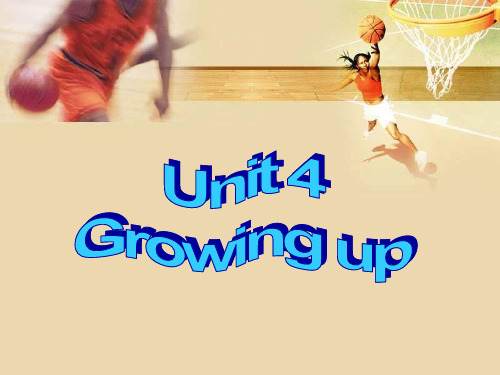
3. 尽管他通过努力进入了校队,但却一点也 不高兴。
A__l_th__o_u_g_h__h_e__g_o_t_i_n_t_o__th__e_s_c_h_o_o__l _te_a__m___ t_h_r_o_u__g_h__h_a_r_d__w_o__r_k_, he was not happy at
They were forced to leave their home town.
10. He remained there for about a year before the NBA took notice of him. remain = stay 逗留 vi. 我们要在上海逗留10天。 We will remain in Shanghai for ten days.
一、根据课文填空: Spud Webb is a retired _A__m_e_r_i_c_a_n_ NBA
player. Though he was a small boy, he had a big _d_r_e_a_m__—he wanted to play in the NBA.
In junior high, though he was _r_ef_u_s_e_d_ to play at first because he was too small, he did not __lo_s_e__ heart. And finally he became the __st_a_r__ of the team.
2. While attending junior high, Spud tried out for the school team …
(1) attend junior high 上初中 (2) try out for sth 参加……选拔(或
英语必修二牛津版第四单元作文
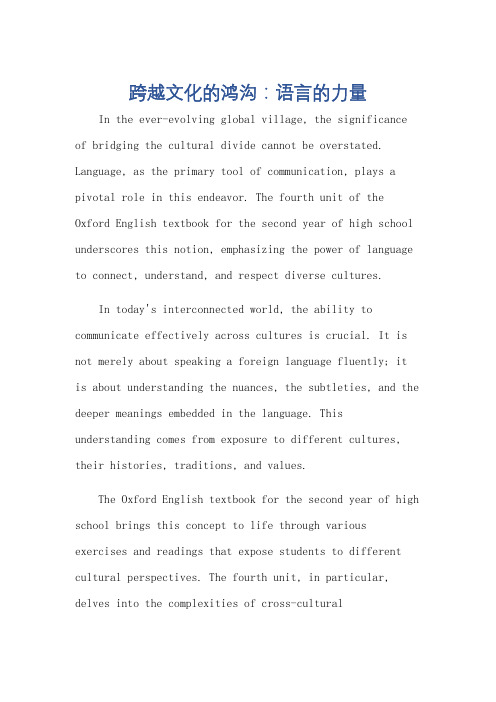
跨越文化的鸿沟:语言的力量In the ever-evolving global village, the significance of bridging the cultural divide cannot be overstated. Language, as the primary tool of communication, plays a pivotal role in this endeavor. The fourth unit of the Oxford English textbook for the second year of high school underscores this notion, emphasizing the power of language to connect, understand, and respect diverse cultures.In today's interconnected world, the ability to communicate effectively across cultures is crucial. It is not merely about speaking a foreign language fluently; it is about understanding the nuances, the subtleties, and the deeper meanings embedded in the language. This understanding comes from exposure to different cultures, their histories, traditions, and values.The Oxford English textbook for the second year of high school brings this concept to life through various exercises and readings that expose students to different cultural perspectives. The fourth unit, in particular, delves into the complexities of cross-culturalcommunication, challenging students to think beyond the literal meaning of words and phrases.One of the key lessons in this unit is the importance of cultural awareness. When communicating with someone from a different cultural background, it is essential to be mindful of their cultural norms and values. For instance, certain topics or behaviors that may be considered acceptable in one culture may be considered taboo in another. By being aware of these differences, we can avoid misunderstandings and conflicts and foster a more harmonious cross-cultural communication.Another significant aspect highlighted in this unit is the role of non-verbal communication. Body language, facial expressions, and tone of voice are all crucial in conveying messages and establishing connections. These non-verbal cues often carry more weight than words alone, especiallyin cross-cultural settings where language barriers can be a challenge.The unit also explores the power of language in shaping cultural identities. Language is not just a tool of communication; it is a反映文化价值观、信仰和传统的镜子。
新牛津译林版英语初二上册第四单元 Integrated skills课件
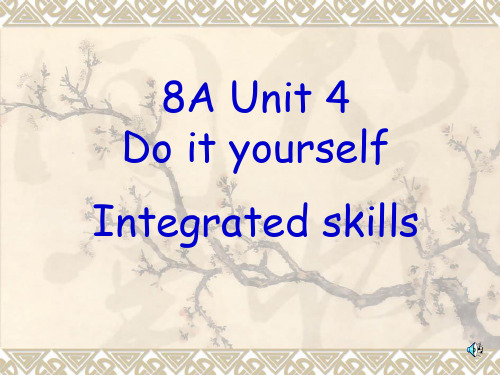
•Retell the orders
•First, _•C__h_o_o_seyour favourite fruit.
•make sure •for example •leave it in the
air
•确保 •例如 for•把som它e留在空气中一段时间
time
•Explaining ❖ make sure 确信,确保,务必
•Please make sure to turn off the computer when you leave •Make sure that you brush your teeeth every night
Enjoy the video
•1. Find out more works about DIY around you.
•2. Make a fruit salad or sandwiches for your parents tonight.
•Then, _•W__a_s_hthe fruit. •Next, _•C__u_t some of the larger fruit •_i_n_to_ small pieces. •At last, _•M__i_x them together. _•A__d_d_ some salad cream if you like.
oranges
in the air
just before turn brown
Step4.Practicing
❖ (Finding)To find out some phrases.
江苏-牛津译林版新教材高中英语必修一第四单元单词全解析(带音标)
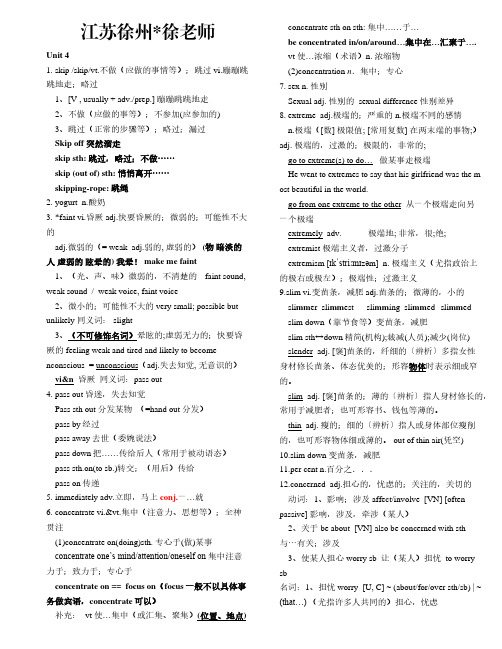
江苏徐州*徐老师Unit 41. skip /skip/vt.不做(应做的事情等);跳过vi.蹦蹦跳跳地走;略过1、[V , usually + adv./prep.] 蹦蹦跳跳地走2、不做(应做的事等);不参加(应参加的)3、跳过(正常的步骤等);略过;漏过Skip off 突然溜走skip sth: 跳过,略过;不做……skip (out of) sth: 悄悄离开……skipping-rope: 跳绳2. yogurt n.酸奶3. *faint vi.昏厥adj.快要昏厥的;微弱的;可能性不大的adj.微弱的(= weak adj.弱的, 虚弱的) (物暗淡的人虚弱的眩晕的) 我晕! make me faint1、(光、声、味)微弱的,不清楚的-- faint sound, weak sound / weak voice, faint voice2、微小的;可能性不大的 very small; possible but unlikely 同义词: slight3、(不可修饰名词)晕眩的;虚弱无力的;快要昏厥的 feeling weak and tired and likely to become nconscious = unconscious(adj.失去知觉, 无意识的)-- vi&n昏厥同义词:pass out4. pass out 昏迷,失去知觉Pass sth out 分发某物(=hand out 分发)pass by经过pass away去世(委婉说法)pass down把……传给后人(常用于被动语态)pass sth.on(to sb.)转交;(用后)传给pass on传递5. immediately adv.立即,马上conj.一…就6. concentrate vi.&vt.集中(注意力、思想等);全神贯注(1)concentrate on(doing)sth. 专心于(做)某事concentrate one’s mind/attention/oneself on 集中注意力于;致力于;专心于concentrate on == focus on(focus一般不以具体事务做宾语,concentrate可以)补充: vt 使…集中(或汇集、聚集)(位置、地点)concentrate sth on sth: 集中……于…be concentrated in/on/around…集中在…汇聚于….vt 使…浓缩(术语)n. 浓缩物(2)concentration n.集中;专心7. sex n. 性别Sexual adj. 性别的 sexual difference 性别差异8. extreme adj.极端的;严重的n.极端不同的感情n.极端([数] 极限值; [常用复数] 在两末端的事物;)adj. 极端的,过激的;极限的,非常的;go to extreme(s) to do…做某事走极端He went to extremes to say that his girlfriend was the m ost beautiful in the world.go from one extreme to the other 从一个极端走向另一个极端extremely adv. 极端地; 非常,很;绝; extremist 极端主义者,过激分子extremism [ɪkˈstriːmɪzəm] n. 极端主义(尤指政治上的极右或极左);极端性;过激主义9.slim vi.变苗条,减肥adj.苗条的;微薄的,小的sli mm er sli mm est sli mm ing sli mm ed--sli mm ed slim down(靠节食等)变苗条,减肥slim sth↔down精简(机构);裁减(人员);减少(岗位) slender adj. [褒]苗条的,纤细的〔辨析〕多指女性身材修长苗条、体态优美的;形容物体时表示细或窄的。
最新版牛津译林版九年级上册英语Unit4单元知识点复习及答案
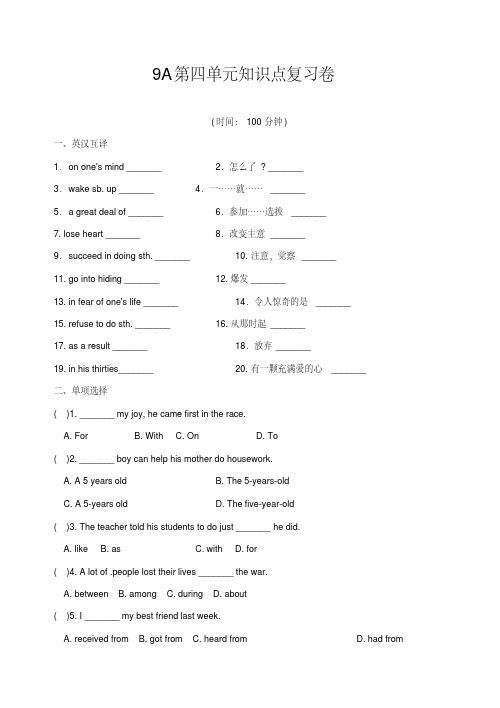
9A第四单元知识点复习卷(时间:100分钟)一、英汉互译1.on one's mind _______ 2.怎么了? _______3.wake sb. up _______ 4.一……就……_______5.a great deal of _______ 6.参加……选拔_______7. lose heart _______ 8.改变主意_______9.succeed in doing sth. _______ 10.注意,觉察_______11. go into hiding _______ 12.爆发_______13. in fear of one's life _______ 14.令人惊奇的是_______15. refuse to do sth. _______ 16.从那时起_______17. as a result _______ 18.放弃_______19. in his thirties_______ 20.有一颗充满爱的心_______二、单项选择( )1. _______ my joy, he came first in the race.A. ForB. WithC. OnD. To( )2. _______ boy can help his mother do housework.A. A 5 years oldB. The 5-years-oldC. A 5-years oldD. The five-year-old( )3. The teacher told his students to do just _______ he did.A. likeB. asC. withD. for( )4. A lot of .people lost their lives _______ the war.A. betweenB. amongC. duringD. about( )5. I _______ my best friend last week.A. received fromB. got fromC. heard fromD. had from( )6. His grandparents both died _______ illness.A. inB. fromC. ofD. for( )7. (2012 .重庆)I didn't believe he could drive a truck _______ he told me.A. onceB. whileC. sinceD. until( )8. (2012 .成都) My cousin knows a lot about Geography, _____ he is only four years old.A. becauseB. soC. althoughD. as( )9. Don't leave the room until your homework_______.A. finishB. finishedC. finishesD. is finished( )10. He was playing a game _______ I came to visit him.A. whileB. whenC. as soon asD. as( )11. _______ he likes English, he doesn't do well in the exams.A. IfB. AlthoughC. AsD. Because( )12. She got up late _______ staying up late.A. becauseB. soC. because ofD. that( )13. Since then, he _______ the film.A. has seenB. has likedC. sawD. is seen( ) 14. I knew _______ English , so I can help youwith your English.A. a littleB. littleC. fewD. a few( )15. He has a heart _______ love.A. filled ofB. fill withC. full withD. full of三、根据句意和汉语提示写出单词, 每空一词l. He likes collecting coins of different_______ (时代).2. My sister studies in Peking _______ (大学).3. She always won lots of_______ (奖学金) when she was at school.4. Which_______ (社团) are you in, Jack?5. It is a_______ (象征) of victory.6. It_______ (证明) that you were right.7. Team_______ (精神) is important, l think.8. -Who broke the_______ (纪录) ? -Liu Dong did.9. Try to be kind and never do anything _______ (违反) the teacher.10. The _______ (看法) are really valuable.11. Who is the student that you _______(敬佩) in your class?12. His mother had a_______ (癌症) two years ago.13. He has no_______ (勇气) to tell you the whole story.14. She was ill and_______ (逗留) in hospital for half a year.15. The student often does some_______ (研究) during the summer holiday.四、根据句意, 用所给单词的适当形式填空1. When I was in_______ (40), I began to teach.2. His_______ (dead) surprised all of us.3. She has to sit behind because of her_______ (high).4. Li Ying became the_______ (proud) student in his class afterthe exam .5. Spud was named_______ (play) of the Year.6. When he_______ (final) got the chance, he had to give it up.7. Build another building for_______ (you).8. Look! The_______ (nation) flag is flying in the wind.9. After graduated from our school, he continued studying in_______ (other) country.10.The girl_______ (quick) gave her answer when she heard thequestion.11. Yao Ming has done a lot of charity work, _______ (especial) forpoor Chineseteenagers.12. My friend Tom often helps the _______ (home) children.13. Our teacher is very_______ (help) and he often helps me withmy Chinese.14. My father has decided to donate his body for_______ (medicine)research afterhis death.15. Do you know the_______ (own) of the house?五、根据句意,用所给动词的适当形式填空1. Ann kept_______ (sleep) for a long time.2. The news_______ (read) by many people in the world recently.3. We decided_______ (have) a class meeting.4. His father didn't allow him_______ (play) this kind of games.5. Whenever I have some money_______ (leave), l give it to thepoor.6. I didn't leave until the film_______ (end).7._______ (not wake) him up, he is too tired.8. Someone thinks_______ (grow) up is hard.9.I will. tell you the answer as soon as I_______ (meet) theteacher.10. After I finished my homework, I went on_______ (read).11. He often invites me_______ (sing) in the evening.12. After that, she_______(name) "School beauty".13. Before watching TV, he was forced_______ (finish) all thehomework.14. We tried everything we could _______ (help) the poor man.15. The boy_______ (play) the piano when his father came backhome.六、根据短文内容及首字母提示填写所缺单词,使短文完整、通顺Mr King taught English in a middle school. He was very b 1 allthe time andcouldn't do some r 2 .So he left the school and opened a book shop in the c 3of the town. It wasn't big enough but all the books were nice and most people liked to buy some there. When the shop was c 4 he could read at home. He knew a lotand the learned(有学问的)person were glad to make f 5 with him.It was Sunday and it was cold outside. Mr King was very busy. At nine in theevening all the buyers left e 6 a girl. She was dressed up and waited for s 7there. Standing by the shelves, she looked over the books one after a 8 .It made them in a fearful mess(凌乱不堪).Mr King came up to her and asked, "Excuse me, madam. What can I do for you?""Your books are all dull(乏味的),”said the girl. "I want a d 9 one.""That's easy, " Mr King smiled. He t 10 out a cookbook(烹调书)and said, "Here you are, madam.”1. _______2. _______3. _______4. _______5._______6 _______ 7. _______ 8. _______ 9. _______ 10._______七、句型转换1.He woke up an hour ago.(改为同义句)He has______________ for an hour.2.I will come back after 10 0'clock.(改为同义句)I______ _come back _______ 10 o'clock.3.I told him the news as soon as he got to the office.(对画线部分提问)_______ _______ you tell him the news?4.He allowed us to have a discussion.(改为被动语态)We _______ _______ to have a discussion.5.He is the tallest boys in our class.(改为同义句)He is_______than _______ other boy in our class.6.While he was reading a magazine, he saw me.(改为简单句)He saw me _______ _______ a magazine.7.I have learned to drive for a year.(改为同义句)I have learned to drive_______a year_______.8.Lots of people died in the accident.(改为同义句)Lots of people _______ their _______ in the accident.9.His brother has sat here for a long time.(对画线部分提问)_______ _______ has his brother sit here?10.I tried my best to learn every subject well.(对画线部分提问)_______ did you try your best to_______?八、根据中文提示完成句子1.姚明1980年出生于上海。
六年级下册牛津版第四单元作文范文英语

Title: A Day at the ZooIt was a bright and sunny day, and the zoo was abuzz with activity. Excited children, along with their parents, were eager to explore the wonders of the animal kingdom. The air was filled with laughter and chatter, creating a festive atmosphere.As we entered the zoo, the first attraction was the elephant enclosure. There, a庞大的大象,with its massive ears flapping and trunk swaying, was enjoying a refreshing bath in a mud pit. Its skin looked shiny and healthy under the sun's rays. We watched in amazement as it effortlessly moved around, its size and strength truly impressive.Next, we made our way to the lion enclosure. The lions were lazily lying in the shade, their golden coats glistening in the sun. Suddenly, one of them stood up and roared, its powerful voice echoing throughout the zoo. It was a reminder of their wild and fierce nature, even in captivity.The monkey enclosure was a lively scene. Monkeys were swinging from branch to branch, playing and jumping around.Some were even stealing snacks from the visitors, much to the delight of the crowd. Their antics were a hit with the younger visitors, who couldn't help but laugh and clap.Later, we visited the penguin enclosure. The penguins were swimming gracefully in the water, their black and white coats standing out against the blue background. They looked so cute and charming as they waddled on land and dived into the water.As the day progressed, we saw many more animals - tigers, giraffes, pandas, and even snakes. Each enclosure had its own unique charm and story to tell.The zoo trip was not just about seeing the animals, but also about learning about them. The signs next to each enclosure provided information about the animals' habitats, diets, and behaviors. It was a great way to educate the younger generation about the importance of conserving our natural heritage.As the sun began to set, we reluctantly made our way out of the zoo. The experience had been unforgettable, and we all looked forward to our next visit. The zoo was notjust a place to have fun, but also a place to appreciate and respect the wonders of nature.**动物园的一天**那是一个阳光明媚的日子,动物园里热闹非凡。
牛津英语7B Unit4 单元知识点

牛津英语7B Unit4 Finding your wayComic strip1.Follow me, Eddie.跟着我,埃迪。
(教材第42页)follow 此处用作及物动词,意为“跟随”,其后可以接表示人或事物的名词或代词作宾语。
The robot follows Mr Green all the time.这个机器人一直跟着格林先生。
He followed her into the house.他跟随她走进房间。
[拓展]①follow用作动词时还可意为“仿效”。
I don't want you to follow my example.我不想让你仿效我。
①follow的形容词形式是following,意为“下述的,下列的”。
Which of the following sentences is right?下列哪个句子是正确的?2 Let's go down here.我们从这儿下去吧。
(教材第42页)down 此处用作副词,意为“下去,向下”,go down意为“向下走”,常表示位置或价格等下降。
They are going down from the top of the hill after planting trees.植树结束后,他们正从山顶往山下走。
[拓展] down还可用作介词,意为“沿着..... 。
Go down this street and you will find the hotel on your left.沿着这条街走,你会发现旅馆在你的左边。
3.Eddie,I think we have to go up again.埃迪,我认为我们得再上去。
(教材第42 页)1)辨析:have to与musthave to与must都含有“必须”之意,后都接动词原形,但用法不同,具体如下。
have to因客观上的需要而“不得不”。
有人称、数和时态的变化。
- 1、下载文档前请自行甄别文档内容的完整性,平台不提供额外的编辑、内容补充、找答案等附加服务。
- 2、"仅部分预览"的文档,不可在线预览部分如存在完整性等问题,可反馈申请退款(可完整预览的文档不适用该条件!)。
- 3、如文档侵犯您的权益,请联系客服反馈,我们会尽快为您处理(人工客服工作时间:9:00-18:30)。
学乐教育2014年暑假八升九一对三辅导讲义Unit 4 A good read重点词组Welcome to the unit1. 一本好的读物 a good read2. 你已经决定怎样处理这些书了吗?Have you decided what to do with these books?3. 我原来不知道你喜欢书。
I didn’t know you liked books.4. 用它们够到冰箱上的盒子use them to reach the box on the fridge.5. 你喜欢什么类型的书?What type of book do you like?6. 一本关于二战时的德国的书 a book about Germany in World WarⅡ7. 对历史书感兴趣be interested in history books8. 增进我对过去的了解improve my knowledge of the past9. 在你的空余时间in your spare time10. 阅读小说和戏剧read novels and plays11. 那个法国作家的一本书the book by the French writer12. 这个丑男的故事真正地感动了我。
The story of the ugly man really touched me. Reading13. 撞到岩石crash against the rocks14. 奋力前游 swim as far as I can15. 感觉到我脚下的土地feel the land under my feet16.筋疲力尽 be tired out17.摔倒在沙滩上fall down on the beach18. 睡觉go to sleep19. 我的胳膊、腿和头发被拴在地上。
My arms, legs and hair were tied to the ground.20. 向下看look down21. 和我的小手指一样大小 the same size as my little finger22. 小人 the tiny person23. 使他们摔倒make them fall over24. 继续在我身上移动continue moving across my body25. 试着挣脱一只手try to pull one hand free26. 设法弄断绳子manage to break the ropes27. 把我的左手举到空中 lift my left hand into the air28. 一大群小人 a huge army of tiny people29. 向我直冲过来come straight towards me30. 逃脱他们run away from them31. 我不知道怎么逃脱。
I didn’t know how to get away.32. 不间断地做某事keep doing something33. 发现他自己不能动弹find himself unable to move34. 站在他的肩膀上 . stand on his shoulder35. 和那些小人交流communicate with the small men Grammar, integrated skills and study skills36. 和他讲这本书talk to him about the book37. 建议我们选择哪些作为课外活动 advise us which to choose as after-school activities38. 自学怎么用电脑画画teach oneself how to use a computer to draw39. 你决定先读哪个了吗?Have you decided which to read first?40. 弄清楚怎么能在如此短的时间内环游世界 find out how to travel around the world in such a short time41. 上交报告hand in the report42. 我仍然不确定在报告中该写什么。
I’m still not sure what to write about in the report.43. 写关于你的书的任何东西write anything about your book44. 等等and so on45. 读一些关于这本书的评论read some reviews about the book46. 使书保持干净整洁keep the books clean and tidy47. 按时还书return the books on time48. 续借这些书 renew the books49. 记得带上你的借书证/学生证 remember to bring your library/ student card50. 在去伦敦的一次旅途中萌生了第一个故事的想法get the idea for the first story on a trip to London51. 所有的英国出版社拒绝出版这本书。
All the British publishing houses refused to publish the book.52. 到目前为止so far53. 一个巨大的成功 a great success54. 把这个故事翻译成70种语言 translate the story into 70 languages55. 亿册400 million copies56. 在二百多个国家和地区in over 200 countries and areas57. 一个加拿大的作者 a Canadian writer58. 在网上搜寻信息search for information on the computer59. 一次at a time60. 我能够借这些书多久?How long can I keep the books?61. 在网上续借他们 . renew them online62. 发现它们真的很有趣find them really interesting63. 航海去寻找隐藏的宝藏sail the sea to look for hidden treasure64. 书中的主人公the main character in the book65. 给我很多自信give me a lot of confidence66. 我不再像以前那样害羞了。
I’m not as shy as I used to be.67. 令人兴奋的经历exciting experiencesTask68. 询问关于书的意见ask for advice on books69. 我的阅读习惯my reading habits70.不同种类的书different types of books71.中国的四大名著 the four great classical Chinese novels72. 在我家对面opposite my home73. 给我很多关于书的意见 give me lots of advice on books74. 忙碌一天后帮我放松help me relax after a busy day75. 向我开启一个全新的世界open up a whole new world to me重点语法must & have to 用法must 表主观的义务和必要,主要用于肯定句和疑问句,“必须,得,要”。
e.g. You must finish your homework today. 你今天必须完成家庭作业。
must 的否定形式must not表示禁止,“不能,不行”。
e.g. You must not smoke here.你不能在这里抽烟。
have to 表一种客观的需要,“不得不”。
have to 有人称和数的变化。
e.g. It is getting dark. He has to go home now. 天快黑了,你现在得回家了。
have to 的否定形式do not have to, 相当于need not 。
e.g. They do not have to buy a computer at the moment.他们目前没有必要买电脑。
e.g. He does not have to go.他不必走。
注意:must 还可以表示肯定猜测,意思是“一定”。
否定的猜测是can’t。
e.g. You must be hungry after all that walking.走了那么远的路,你一定饿了吧。
That can’t be Lucy. She has gone to American.那肯定不是Lucy,她已经去了美国Test for 8B Unit 4I. Multiple choice:(1’×15=15%)( )1. It is _____ugly animal. And I think it is ____ ugliest one I have ever seen.A. a; theB. an; theC. an; /D. the; an( )2. I don’t like playing basketball, _______.A. tooB. alsoC. eitherD. as well( )3. —It’s time to go to bed, Mary.—Oh, Mum, I won’t go to bed _____ I have finished my homework.A. afterB. untilC. sinceD. because( )4. — Can we ask Jeff for help with our party?—You’d better not. He is the last person _____.A. to arriveB. to reachC. to arrive atD. to get to( )5. I think __________ important to read English every day.A. thisB. thatC. itD. that is( )6. You ________ buy anything if you ________ it.A.needn’t; needn’tB. needn’t; don’t needC.don’t need; need toD. don’t need; don’t need( )7. I want to read some books that can ______ me.A. touchB. reachC. makeD. like( )8. I have no time to look after my dog. Could you tell me ______ to do with it?A. howB. whatC. whenD. where( )9. —Must I read the text first? —No, you _______. You ______ read it later.A. mustn’t; canB. can’t; canC. needn’t; mayD. mustn’t; must( )10. I have ______ the magazine for two weeks. I must return it tomorrow.A. readB. boughtC. borrowedD. kept( )11. My mother always asks me to remember several words _______ instead of many words.A. at a timeB. at timesC. all the timeD. from time to time( )12. Because of his broken leg, he _______ stay at home, hoping to get well soon and go to school.A. mustB. couldC. mayD. had to( )13. Which of the following is Right?A. He will tell us why to choose the book.B. Can you tell me how to do?C. I am wondering which music to listen to.D. The students asked their teacher when to hand in it.( )14. What great fun it is to fly kites in ______ weather!A.so fine B.so fine a C.such a fine D. such fine( )15.—Could you help me carry the box? — ___________.A. You’re welcome.B. My pleasure.C. Don’t mention it.D. With Pleasure.Ⅱ.Cloze (1’×10=10%)A man was really worried about his son, who was sixteen years old but had no courage at all. So the father decided to call on a Buddhist monk to 1 his child.The Buddhist monk said to the boy's father, "You 2 leave your son here. I'll make him3 a real man within three months. However, you can’t come to see him during this period."Three months 4 , the boy's father returned. The Buddhist monk arranged a boxing match between the child and an experienced boxer.5 the boxer struck(打) the boy, he fell down, but the boy stood up quickly. Several times later, the Buddhist monk asked," What do you6 of your child?" "What a shame!"The boy's father said. "I have7 thought he would be so easily knocked down. He needn't stay here any longer.""I'm sorry that's all you see. 8 you see that each time he falls down he stands up again9 crying? That's the kind of 10 that you wanted him to have."If each time you are knocked down you have the courage to stand up again, that’s the real courage.( )1. A. plan B. train C. solve D. decide( )2. A. should B. can’t C. need D. mustn’t( )3. A. for B. of C. from D. into( )4. A. ago B. later C. late D. before( )5. A. At times B. Next time C. Each time D. Some time( )6. A. think B. like C. feel D. hope( )7. A. ever B. never C. even D. often( )8. A. Do B. Did C. Don’t D. Doesn’t( )9. A. instead B. without C. and D. besides( )10. A. courage B. hope C. reply D. promiseIII. Fill in the blanks according to the Chinese, or English explanations: (1’×9)1. Please read some ________ (评论) about the book before writing.2. The young came in and sat __________ (在…对面) me.3. Don’t sit on my _________ (腹部). It hurts.4. Don’t stand __________(紧靠) the tree. The tree may get hurt.5. No one can get _________ (成功) without hard work.6. An _______ (大群) of fans gathered at the airport to welcome their hero.7. We have ten _______ (手指)and each of them collects with our body.8. He _________ (keep doing sth.) working after a short break just now.9. Look at those _________ (very small) people. How lovely!IV. Fill in the blanks with the proper forms of the given words (1’ ×11=10%)1.The book is written by a _________ (Canada) woman, Lily. But she lives in _________ (German) now.2. I want to buy several _______ (copy) of Readers’ Digest.3. This is a famous _________ (publish) house.4. So far, the sun ____________ (rise) high in the sky.5. I am sorry that I have made him _______ (worry) about me.6. Look! The man _______(tie) the camel to a tree.7. Our English teacher gave us lots of (advice) on the study of a foreign language.8. I think he will be _______ (able) to work out the problem as it is too difficult.9. I always study as ______ (hard)as him, but I do not study as ______(good) as him.V. Sentence Transformation (1×10=10%)1. He needn’t get up so early. (改为同义句) He _____ _____ _____ get up so early.2. This car is red and that car is red, too. (改为同义句)That car is _____ _____ ______ as this car.3. Could you tell me how to get to the park? (改为同义句) Could you tell me how _____ _____ get to the park?4. After she had cleaned up the house, she was really happy about it. (改为同义句)_______ ______ up the house, she was really happy about it.VI. Complete the sentences (0.5×30=15%)1.将来,我想环游世界,有令人激动的经历。
